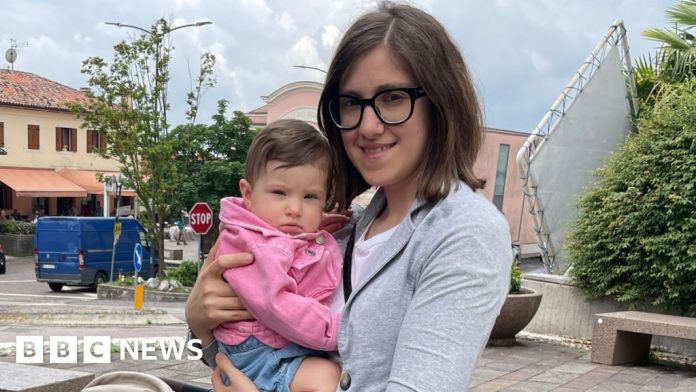Southern and Eastern Europe correspondent
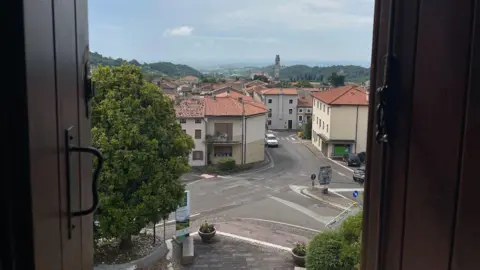 BBC
BBCWinding down the narrow main street of his north Italian town, Giacomo de Luca points to the businesses that have closed: two supermarkets, a barbershop, restaurants – all with shutters drawn and faded signs above their doors.
The pretty town of Fregona at the foot of the mountains is emptying out like many here, as Italians have fewer children and increasingly migrate to bigger places or move abroad.
Now the local primary school is at risk and the mayor is worried.
“The new Year One can’t go ahead because there are only four children. They want to shut it down,” De Luca explains. The minimum class size to get funding is 10 children.
“The drop in births and in the population has been very, very sharp.”
The mayor calculates that the population of Fregona, an hour’s drive north of Venice, has shrunk by almost a fifth in the past decade.
By June this year there were just four new births and most of the 2,700 or so remaining residents are elderly, from the men drinking their morning prosecco to the women filling their bags with chicory and tomatoes at the weekly market.

For De Luca, closing the school reception class would be a tide-turner: if the children leave Fregona to study, he fears they will never look back.
So he’s been touring the surrounding area, even visiting a nearby pizza factory, trying to persuade parents to send their children to his town and help keep the school open.
“I’m offering to pick them up with a minibus, we’ve offered for children to stay at school until six in the evening, all paid for by the council,” the mayor told the BBC, his sense of urgency obvious.
“I’m worried. Little by little, if things keep going like this, the village will die.”
Nationwide problem
Italy’s demographic crisis extends far beyond Fregona and it is deepening.
Over the past decade, the population nationwide has contracted by almost 1.9 million and the number of births has fallen for 16 consecutive years.
On average, Italian women are now having just 1.18 babies, the lowest level ever recorded. That’s under the EU average fertility rate of 1.38 and far below the 2.1 needed to sustain the population.
Despite its efforts to encourage childbirth, and much talk of family-friendly politics, Giorgia Meloni’s right-wing government has been unable to stop the slide.
“You have to think a lot before having a baby,” Valentina Dottor admits when we meet on Fregona’s main square, her 10-month-old daughter Diletta cooing in a pushchair.
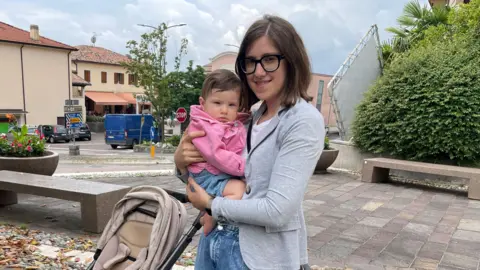
Valentina gets an allowance of around €200 (£175) a month for Diletta’s first year, but just missed out on the government’s new Baby Bonus of €1,000 for children born in 2025.
There are new tax breaks, too, and longer parental leave.
But Valentina now needs to return to work and says accessing affordable childcare is still very tough.
“There are not many babies, but not many kindergarten [places] either,” she says. “I am lucky to have my grandmother take care of my daughter. If not, I don’t know where I would leave her.”
That’s why her friends are wary of motherhood.
“It’s difficult – because of work, schools, the money,” Valentina says. “There is some help, but it’s not enough to have babies.
“It won’t solve the problem.”
Self-help schemes
Some companies in the Veneto region have taken matters into their own hands.
A short drive down into the valley from Fregona is a big industrial estate filled with small and medium-sized firms, many run by families.
Irinox, a blast chiller manufacturer, spotted the parenting problem long ago and decided to act rather than lose valuable workers.
The firm joined forces with seven others to create a creche a short walk from the factory floor – not free, but heavily discounted and convenient. It was the first of its kind in Italy.
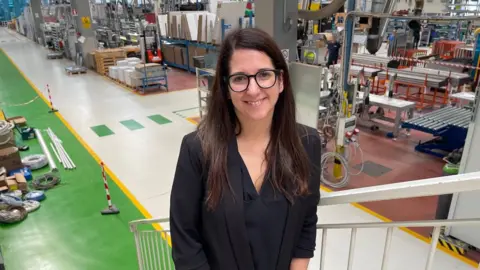
“Knowing I had the chance to put my son two minutes from here was very important, because I can reach him any time, very fast,” one of the firm’s finance bosses, Melania Sandrin, explains.
Without the creche she would have struggled to return to work: she didn’t want to lean on her own parents, and state kindergartens won’t generally take children for a full day.
“There’s also a priority list… and there are few, few places,” Melania says.
Like Valentina, she and her friends delayed having children into their late 30s, keen to establish their careers, and Melania isn’t sure she’d have a second baby, even now. “It’s not easy,” she says.
Later childbirth, a growing trend here, is another factor in lowering fertility.
All of that is why CEO Katia da Ros thinks Italy needs to make “massive changes” to address its population problem.
“It’s not the €1,000 payments that make a difference, but having services like free kindergartens. If we want to change the situation we need strong action,” she says.
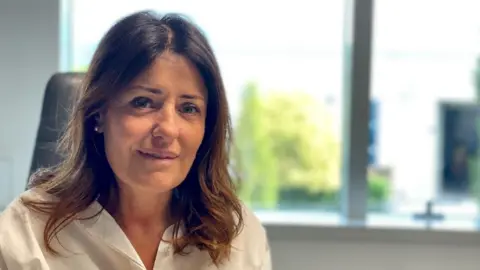
The other solution is increased immigration, which is far more contentious for Meloni’s government.
More than 40% of the workers at Irinox are already from abroad.
A map on the factory wall dotted with pins shows they come from Mongolia to Burkina Faso. Barring an unlikely sudden surge in childbirth, Katia da Ros argues Italy – like Veneto – will need more foreign workers to drive its economy.
“The future will be like that.”
End of a school era
Even immigration couldn’t save a school in nearby Treviso.
Last month, Pascoli Primary shut its doors for good because there weren’t enough pupils to sustain it.
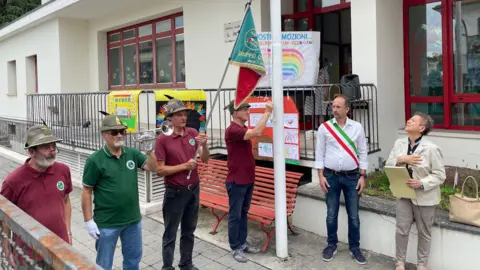
Just 27 children gathered on the school steps for a final ceremony marked by an Alpine bugler with a feather in his hat, who sounded the Last Post as the Italian flag was lowered.
“It’s a sad day,” Eleanora Franceschi said, collecting her 8-year-old daughter for one last time. From September, she’ll have to travel much further to a different school.
Eleanora doesn’t believe the falling birthrate alone is to blame: she says Pascoli school didn’t teach in the afternoons, making life harder for working parents who then moved their children elsewhere.
The headteacher has another explanation.
“This area has been transformed because many people from abroad came here,” Luana Scarfi told the BBC, referring to two decades of migration to the Veneto region with multiple factories and plenty of jobs.
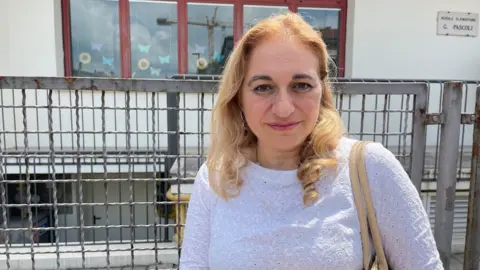
“Some [families] then decided to go to other schools where the immigration index was less high.”
“Over the years, we had lower and lower people who decided to come to this school,” the headmistress says, in English, hinting at tensions.
A UN prediction suggests Italy’s population will drop by about five million in the next 25 years, from 59 million. It’s ageing, too, increasing the strain on the economy.
Government measures to tackle that have so far only scratched the surface.
But Eleanora argues parents like her need a lot more help with services, not just cash handouts, for a start.
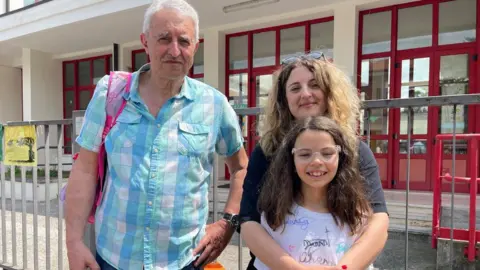
“We get monthly cheques but we need practical support, too, like free summer camps for the children,” she says, pointing to the three-month school holiday from June that can be a nightmare for parents who work.
“The government wants a bigger population but at the same time, they’re not helping,” Eleanora says.
“How can we have more babies in this situation?”
Produced by Davide Ghiglione.

